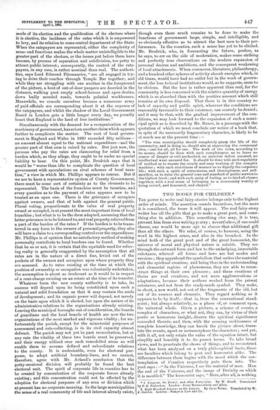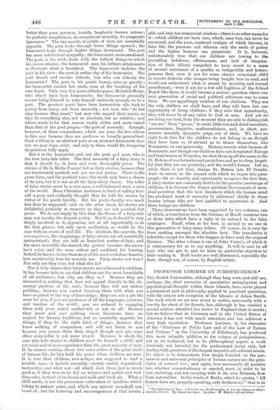TWO BOOKS FOR CHILDREN.*
THE power to write real fairy-stories belongs only to the highest order of minds. The assertion sounds hazardous, but the more it is considered, the truer it will appear. The real fairy-story
writer has all the gifts that go to make a great poet, and some- thing else in addition. This something else may, it is true, prevent him from ever writing poetry ; nevertheless, if one could choose, one would be more apt to choose that additional gift than all the others. We refer, of course, to humour, using the word in the highest sense, and also in the broadest. In the mind both of the great poet and of the great humourist, the universe of moral and physical nature is soluble. They see through the outward form and law to the underlying, immutable substance, whereof all forms and laws are but modes and versions ; they apprehend the symbolism that unites the material with the spiritual creation ; and being thus in the understanding and elemental regions of phenomena, they are able to recon- struct things at their own pleasure ; and these creations of theirs arc real creations, and not mere agglomerations or adaptations, because their authors worked from the primal substance, and not from the ready-made symbol. They make, in short, a new world, not out of the fragments of the old, but out of its essence and elements. They regard nothing as it appears to be by itself,—that is, from the conventional stand- point ; but always relatively, as a phase of, or comment upon, the universal whole. Given a picture, a scheme of events, a complex of characters, or what not, they can, by virtue of their poetic or humorous insight, discern the spiritual significance concealed therein, and then, with the seeming recklessness of complete knowledge, they can knock the picture about, trans- . late the events, upset or metamorphose the characters ; and yet, with it all, not only retain the value of the equation intact, but simplify and beautify it to its purest terms. To take broad views, and to penetrate the shows of things, and to reconstruct what has been analysed on a truly philosophical basis, these are faculties which belong to poet and humourist alike. The difference between them begins with the mood which the con- templation of Creation respectively puts them into. The poet says In the Universe, I see the material of man. Man the end of the Universe, and the image of Divinity on which it is moulded." The humourist says, "Here, after all, is nothing
• 1. Longnose, the Dwarf; and other Ntiry.talos. By W. Banff. Translated by P. E. Pinkerton. London: Swan Sonnenechein and Allen. 2. Eight Hundred Lame, on the Amazon. By slies Verne. Translated by W. J. Gordon. London : Sampson Low and Co.
better than poor, perverse, lovable, laughable human nature ; its pathetic naughtiness, its complacent morality, its pragmatic ignorance." The two moods, or points of view, are essentially opposite. The poet looks through lower things upward ; the bumourist looks through higher things downward. The poet has more intellectual sympathy ; the humourist, more emotional. The poet, in his work, deals with the loftiest things to which his vision attains ; the humourist uses his loftiest attainments to illustrate what is humblest. The humourist includes the poet in his view ; the poet is rather shy of the humourist. The poet dreads and resents ridicule, but who can ridicule the humourist? The poet, in his poetic frenzy, aims at gravity ; the humourist cannot but smile, even at the breaking of his own heart. Only very few poets (Shakespeare, Heinrich Heine, who else ?) have been humonrists ; the humourist generally cannot bring himself to take himself seriously enough, to be a poet. The greatest poets have been humourists who took to poetry from fancy, not from necessity ; not men who "do but sing because they must," but men who regard their music, as they do everything else, not as absolute, but as relative ; and whose music is for that reason vastly richer and more varied than that of the poet proper,—the poet of necessity. Enough, however, of these comparisons, which are none the less odious in this case because they are perforce so broadly generalised. Such a thing as an abstract poet or an abstract humourist does not, we may hope, exist ; and only to them would the foregoing disquisition fully apply.
But it is the humourist, and not the poet quit poet, who is the true fairy-tale teller. The first necessity of a fairy-story is that it should be, in form and tone, thoroughly prose. The stories of De la Motte Fouque fail as fairy-stories, because they are inveterately poetical, and yet are not poetry. There is the prose form, and the poetical tone ; the result may have a charm of its own, but it is not at all the fairy-story charm. The teller of fairy. stories must be a wise man, a well-balanced man, a man of the world. Hans Christian Andersen is fond of calling him- self a poet, and evidently thought that he told his stories by virtue of his poetic faculty. But his poetic faculty was much less than he supposed ; and on the other hand, his stories are delightful, precisely in measure as they are not poetical, but prose. We do not imply by this that the theme of a fairy-tale may not involve the deepest poetry. But if so, it should be very deeply involved in it, appearing not at all superficially or at the first glance, but only upon meditation, as would be the ca.se with an event of real life. The idealism, the marvels, the 2ton-sequitur8, the imaginings, of fairy-stories are all essentially anti-poetical ; they are told as homeliest matter-of-fact ; and the more incredible the marvel, the quieter becomes the narra- tor's voice, and the more artless and confident his bearing. Indeed, he knows, better than most of his most credulous hearers, how unutterably true his marvels are. Fairy-stories not true ? Not only are they true, but what else is ?
Nor is it by chance that fairy-stories are addressed to children. It has become trite to say that children are the most formidable of all audiences ; but why are they so Because they are interested in nothing that does not appeal directly to the ele- mental passions of the soul ; because they will not endure padding ; because you cannot humbug them with what you have acquired in the way of knowledge ; they care not a pin the more for you, if you are professor of all the languages, sciences, and vanities of the world ; you are reduced to engaging them with your naked mother-wit, or not at all. Because they know and care nothing about literature, have no respect for literary traditions, but an insatiable appetite for things, if they be the right kind of things; because they • know nothing of comparison, and will not listen to you because you assure them that, stupid though you are, some other story-teller is yet more stupid. Because, in short, the man who tells stories to children must be himself a child, and yet wiser and of more experience than the great majority of men. If he cannot combine these two extremities of the great circle of human life, let him hold his peace when children are near. It is true that children, now-a-days, are supposed to read a terrible mass of hybrid enormity—moral, useful, dogmatical, instructive, and what not—all which does them just as much good as if they were to be fed on tobacco and spirits and wed- ding-cake, instead of on bread-and-milk and fresh air. What a child needs, is not the precocious cultivation of faculties which belong to mature years, and which any mature numskull can boast of; but the fostering and encouragement of that invalu-
able and only too evanescent wisdom—there is no other name for it—which children are born into, which, once lost, can never be recovered, and the poor, scattered vestiges of which become, in later life, the precious soil wherein only the seeds of poetry and the higher humour can germinate. It is, however, unfortunately true that our children are (owing to the prevailing indolence, officiousness, and lack of imagina- tion of their elders) compelled to have resort to a mass of mental nutriment of a quality so indigestible and hetero- geneous that, were it not for some chance occasional child in remote districts who escapes being taught how to read, and would not understand what is meant by morality and eternal punishment,—were it not for a few odd fugitives of the School Board like these, it would become a serious question where our next generation of social and political reformers was to come from. We are appallingly reckless of our children. They are the only children we shall have, and they will have but one opportunity of being children; if they miss that opportunity, they will never be of any value to God or man. And yet we are doing our best, from the moment they are able to distinguish " ma-ma " from "pa-pa," to make little cut-and-dried moralists, grammarians, linguists, mathematicians, and, in short, pre- mature mentally dyspeptic prigs, out of them. We have no right to do this, for the children do not belong to us, though they have been so ill advised as to throw themselves, like Bonaparte, on our generosity. History records what became of Bonaparte, and though our -children have not devastated Europe and been beaten at Waterloo, we shut them up all the same in the St. Helena of our formulas and prejudices, and go to sleep, forget- ful that they are our posterity, and the world's future. Let us, while there is yet time, change St. Helena into El Dorado. And—to return to the remark with which we began this para- graph—let us humbly and repentantly recognise the fact that, if fairy-stories are commonly held to be the peculiar pasturage of children, it is because the deeper spiritual discernment of man- kind perceives that the best literature which the human mind has produced must of necessity be addressed chiefly to those human beings who are best qualified to appreciate it. And those beings are children.
These observations have been suggested by two volumes, one of which, a translation from the German of Hauff, contains two or three tales which have a right to be entered in the fairy catalogue. Hauff, when at his best, is second to no one in this generation of fairy-story tellers. Of course, he is very far from ranking amongst the absolute best. The translation is tolerable, except for those who happen to have read the original German. The other volume is one of Jules Verne's, of which it is unnecessary for us to say anything. It will be read by all boys who can get it, and we have no particular objection to their reading it. Both books are well illustrated, especially the first ; though not, of course, by English artists.















































 Previous page
Previous page